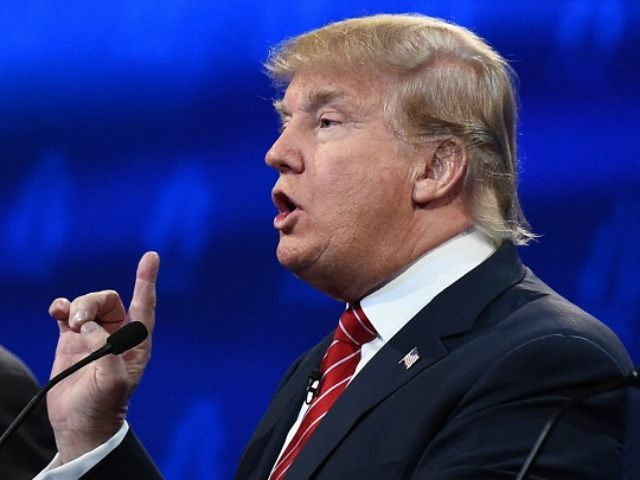At the CNBC Republican primary debate, Donald Trump walked away from two critical elements of his immigration policy. He downsized his proposed U.S.-Mexico border wall, and he disavowed his prior commitment to curb corporate use of foreign university graduates.
Instead of a coast-to-coast, 3,000-mile wall across the United States, Trump said he wanted to build a 1,000-mile wall, without extending it to parts of the border that are rugged.
We’re going to build the wall, we’re going to create a border… They built The Great Wall of China. That’s 13,000 miles. Here, we actually need a thousand, because we have natural barriers. So we need a thousand. We can do a wall. We’re going to have a big, fat beautiful door right in the middle of the wall. We are going to have people come in, but they are coming in legally.
He did not mention his prior promise to return U.S.-educated, U.S.-trained, illegal immigrants to their home countries.
When he was asked about the growing number of foreign university graduates now being imported to take well-paying white-collar jobs from Americans, Trump denied his prior statement that described Sen. Marco Rubio as “Mark Zuckerberg’s personal Senator.”
“I never said that. I never said that,” Trump responded vehemently.
Trump even welcomed the arrival of more foreign graduates — “It is fine if they come in, they have to come in legally” — and he referred to Zuckerberg as “Mark.”
As far as Mark is concerned, as far as the visas are concerned, if we need people, they have — it’s fine. They have to come into this country legally. We have a country of borders. We have a country of laws. We have to obey the laws. It’s fine if they come in, but they have to come in legally..
I was not at all critical of him. I was not at all. In fact, frankly, he’s complaining about the fact that we’re losing some of the most talented people. They go to Harvard. They go to Yale. They go to Princeton. They come from another country and they’re immediately sent out. I am all in favor of keeping these talented people here so they can go to work in Silicon Valley.
Trump’s answer was linked to Rubio, who has a two-stage plan to allow an huge increase of H-1B guest workers — and an unlimited number of foreign college graduates — to work in the U.S. professional sector. Those foreign workers would also be rewarded with U.S. citizenship if they get and hold a job in the United States.
Rubio sidestepped the criticism that the low-wage guest-workers undercut Americans’ wages by suggesting he would act against companies that violate the rules.
“Well, I believe that there are abuses, those companies should be permanently barred from ever using the program again and we should put strict standards in place to ensure that they’re not being abused, like the prevailing wage requirement and like the advertising requirement,” Rubio said. He did not step back from his plan to allow employers to hire foreign white-collar graduates in place of Americans.
Former Gov. Jeb Bush’s economic plan also calls for an increased inflow of foreign graduates.
Trump’s original policy, drafted in August with support from GOP populist Sen. Jeff Sessions — said a reduction in the number of imported university workers “will improve the number of black, Hispanic and female workers in Silicon Valley who have been passed over in favor of the H-1B program.”
Trump’s August immigration statement also slammed Rubio. “Mark Zuckerberg’s personal Senator, Sen. Marco Rubio, has a bill to triple H-1Bs that would decimate women and minorities.”
Trump’s original rollback plan jumpstarted his presidential campaign and has proved very popular among his supporters. For example, the plan was posted to more than 28,000 Facebook sites when it was published at Breitbart.com.
Currently, more than 800,000 foreign graduates are working as temporary ‘guest-workers’ in the United States. They’re in a wide variety of jobs — doctors, architects, accountants, designers, teachers, engineers and software experts. That 800,000 number is roughly equivalent to the total annual output of skilled American graduates, but the guest-workers accept much lower pay than needed by experienced, middle-aged, child-rearing American professionals, including pharmacists, industrial designers, and software developers.
The guest-workers’ lower wages help spike stock values on Wall Street. For example, Zuckerberg’s stock-value in Facebook is worth roughly $45 billion.
Trump’s August plan is largely based in Sen. Session’s labor-force policies, which would boost jobs and wages for Americans by sharply reducing the annual inflow of 700,000 temporary foreign workers and of one million immigrants.
In 2013, President Barack Obama and the 1965 immigration law added roughly two million new foreign workers, just as 4.4 million young Americans joined the workforce. That year, Americans’ wages stalled, and the stock market grew by roughly $5 trillion.
Trump’s turnabout on the foreign-worker issue is also seen in his pending book, Crippled America: How to Make America Great Again.
“I don’t want to stop legal immigration to this country. In fact, I would like to reform and increase immigration in some important ways,” he writes on page 29, according to a Politico article.

COMMENTS
Please let us know if you're having issues with commenting.